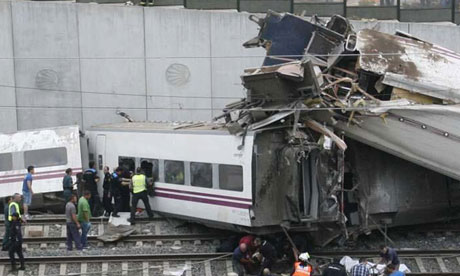 |
| SPAIN TRAIN CRASH |
Excessive speed has been identified as the likely main cause of the accident, official sources told Reuters as hospitals treated some of the 178 injured, including five Americans.
Spain has declared three days of national mourning over the crash, Europe’s worst mainline rail accident for more than 25 years. The death toll has climbed to 80 and could rise further, Galicia regional officials told Reuters and AFP.
The horrific moment when the express train left the tracks on Wednesday night was captured on security video obtained by Spain’s El Pais newspaper.
Images from the scene showed bodies covered in blankets and towels lying next to toppled and crushed carriages as rescuers worked to pull survivors out of broken windows.
The driver - one of two in the cab at the time of the crash - has been put under formal investigation, a spokeswoman for Galicia's High Court told Reuters.
El Pais cited sources close to the investigation saying the driver stated immediately after the crash that he had been traveling at 118 mph on the curve, which had a speed limit of 49 mph.
Trapped in his wrecked cab, he reportedly told supervisors over the radio: "We're human! We're human," according to El Pais. "I hope there are no fatalities because they will fall on my conscience," he said, according to the newspaper’s source. NBC News was unable to immediately confirm the report.
Five U.S. citizens were among the injured, the State Department said in a statement. It said it had not received reports of any American fatalities but added that the situation "may change as we receive additional information."
All of the bodies had been removed from the wreckage by Thursday morning.
So many local residents lined up to donate blood that officials were forced to open additional donation points.
Spain's prime minister, Mariano Rajoy. declared three days of national mourning after visiting the site.
"The scene is shocking, it's Dante-esque," the head of Spain's Galicia region, Alberto Nunez Feijoo, said in a radio interview, according to Reuters.
Local health officials said 178 were injured, of which 95 were still in hospital, of whom 36 - including four children - were in a critical condition.
 |
It also cast a shadow of tragedy over the entire Galicia region, which had been due to celebrate a public holiday Thursday.
Santiago de Compostela had been preparing for the festival of Saint James, when thousands of Christian pilgrims from around the world pack the streets. It is likely the train was packed full with people traveling for the holiday.
Officials said all of the celebrations, including a traditional High Mass at the city’s centuries-old cathedral, were canceled.
The eight-car Alvia express train was traveling from the capital, Madrid, to the city of Ferrol when it derailed about two miles short of Santiago de Compostela station, national train operator Renfe said in a statement.
Spain’s rail network is one of the most modern and successful in Europe, following decades of public investment.
Transport expert and author Christian Wolmar said it was not clear if high-tech safety systems, which override inputs by the driver, would have been in use at the time.
“On high speed lines, the European Train Control System should automatically correct the speed of the train, but this accident may have happened on a stretch of line which is not designated as high-speed,” he said.
Rail workers’ union SEMAF expressed “support for the comrade who has been implicated in this accident” as well as “condolences” to the victims, according to RTVE.
The crash is Spain’s biggest disaster since the 2004 terror attack at Madrid’s Atocha station that left 191 dead, and its worst train crash since 1972 when a collision left 86 dead.
In November 2000, 155 people were killed when a fire in a tunnel engulfed a funicular train packed with skiers in Austria.
In Montenegro, up to 46 people were killed and nearly 200 injured in 2006 when a packed train derailed and plunged into a ravine outside the capital, Podgorica.

No comments:
Post a Comment